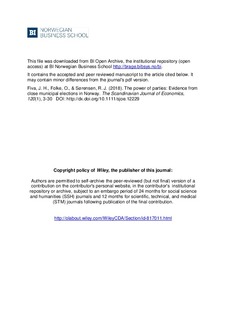| dc.contributor.author | Fiva, Jon H. | |
| dc.contributor.author | Folke, Olle | |
| dc.contributor.author | Sørensen, Rune Jørgen | |
| dc.date.accessioned | 2018-01-16T11:51:28Z | |
| dc.date.available | 2018-01-16T11:51:28Z | |
| dc.date.created | 2016-12-29T20:38:20Z | |
| dc.date.issued | 2018 | |
| dc.identifier.citation | The Scandinavian Journal of Economics, 2018, 120(1), 3-30 | nb_NO |
| dc.identifier.issn | 0347-0520 | |
| dc.identifier.issn | 1467-9442 | |
| dc.identifier.uri | http://hdl.handle.net/11250/2477756 | |
| dc.description | The accepted and peer reviewed manuscript to the article | nb_NO |
| dc.description.abstract | We show that small shifts in representation can affect policy in proportional election systems. Using data from Norway, we find that a larger left-wing party leads to more property taxation, higher childcare spending, and lower elderly care spending, while local public goods appear to be a non-partisan issue. These effects are partly due to shifts in bloc majorities, and partly due to changes in the left–right position of the council, keeping the majority constant. The estimates on spending allocations are rather imprecise, but they are consistent with evidence on politicians' fiscal preferences and patterns in media attention. | nb_NO |
| dc.language.iso | eng | nb_NO |
| dc.publisher | Wiley | nb_NO |
| dc.title | The Power of Parties: Evidence From Close Municipal Elections in Norway | nb_NO |
| dc.type | Journal article | nb_NO |
| dc.type | Peer reviewed | nb_NO |
| dc.description.version | acceptedVersion | nb_NO |
| dc.source.journal | The Scandinavian Journal of Economics | nb_NO |
| dc.identifier.doi | 10.1111/sjoe.12229 | |
| dc.identifier.cristin | 1418230 | |
| dc.relation.project | Norges forskningsråd: 179552 | nb_NO |
| dc.description.localcode | 2, Forfatterversjon | nb_NO |
| cristin.unitcode | 158,3,0,0 | |
| cristin.unitname | Institutt for samfunnsøkonomi | |
| cristin.ispublished | false | |
| cristin.fulltext | preprint | |
| cristin.qualitycode | 2 | |
